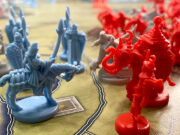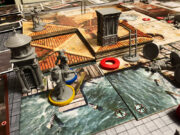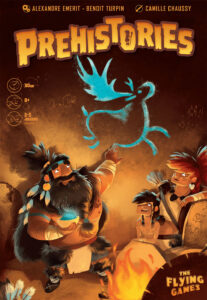 Tony: “Do you want to review this game?
Tony: “Do you want to review this game?
*Tony holds up a copy of Prehistories*
Me: Yes!
That is the true story of how I received my copy of Prehistories.
Gameplay Overview:
Prehistories is an auction and polyomino tile placement game for two to five players. Games play quickly, taking between 20 and 40 minutes.
The game is played over numerous turns, with four phases per turn:
- Round setup – Empty Hunting Zones are replenished.
- Planning – Players bid by selecting cards (or choose not to select any cards) from their hand to form their hunting party and place them facedown. Cards are revealed and turn order is established with the player with the lowest hunting number going first, the next lowest second, etc. Ties are broken by the fastest hunter in the cards played.
- Hunting – In turn order, players commit hunters to hunting zone(s) and collect an Animal Tile if their strength is high enough, then draw new cards depending on the success of the hunt.
- Painting – In turn order, players place the tile in their cave, trying to complete objectives.
Turns continue until one player completes 8 objectives, at which point the game immediately ends and that player is crowned the winner!
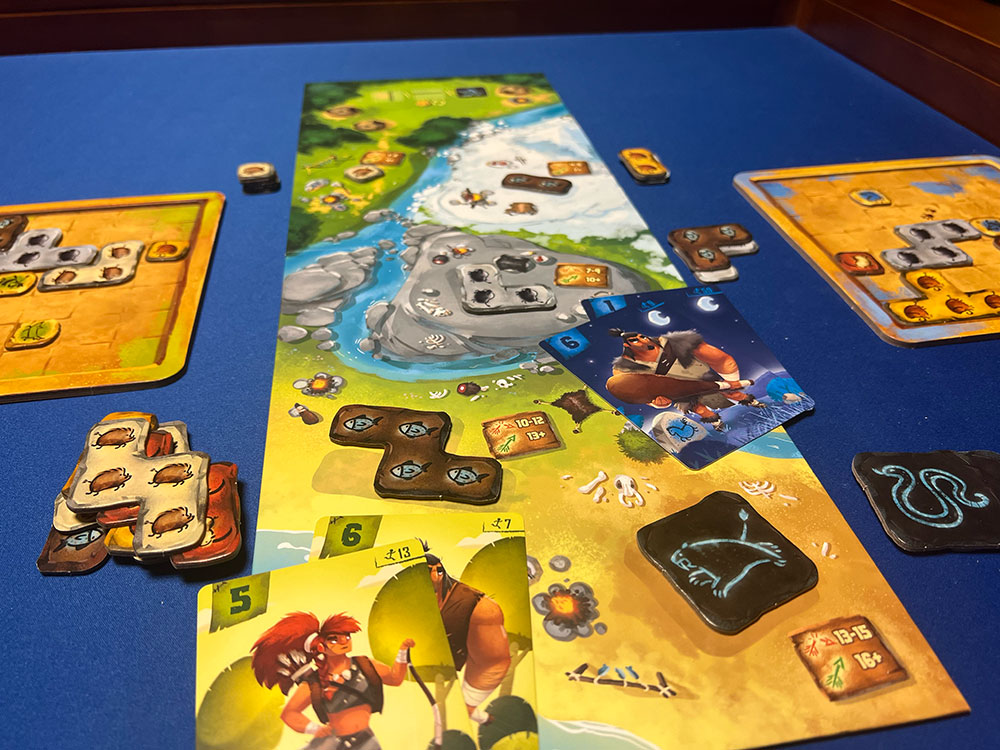
Game Experience:
It might be a case of lower expectations as I am not a huge family/lightweight game guy, but I really enjoyed Prehistories. The premise of the game intrigued me, but I found it more entertaining than I expected!
By far the most thought-provoking and entertaining mechanism of the game is planning your hunting party. Every player has 12 Hunter cards, made up of two copies of one through a six strength; however, each Hunter card has a unique speed number, with the lower numbered Hunters having a higher speed number. You can play any number of Hunters facedown (or no Hunters if you want to draw more cards on your turn).
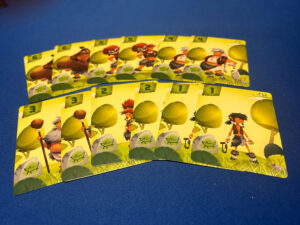
The hook is correctly balancing speed, so you can pick a zone before someone else claims it, and strength, allowing you to actually hunt in the zone you want. Do you want to be first to pick your Hunting zone, but have to pursue smaller animals, or do you want to commit several cards, knowing you will be going last and hoping no one else has the strength to hunt your target? This interaction is entertaining as it allows player interaction without direct take that.
Animals come in 5 types, with two in each size one though size four, as well as four legendary animal tiles, which are five-sized. Each hunting zone has two different strength requirements. The lower requirement will result in a successful hunt, but with one wound, while the higher requirement will be a one for no wounds. Why do wounds matter? They determine the number of cards you can draw at the end of the Hunting phase. As mentioned above, you do not have to send all or any of the Hunters you placed facedown. Unused Hunters come back to your hand and, if no animal tiles were earned, you get to draw three cards. This is a great way to either bail on a hunt when someone gets there before you do or to build up your card options for the next Planning phase.
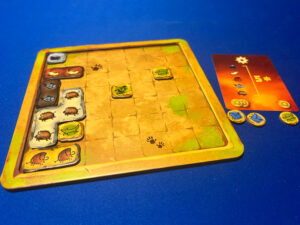
You will want to record your victorious hunts by painting your cave so generations of hunters can relive your glory days. Also, you probably want to win the game. That is done by completing objectives, such as filling in a row or column on your cave board or to be the first to complete one of the random card objectives that were drawn (get it…drawn) during set up.
After a successful hunt, you place the tile in your cave. The first tile must have at least one square in the leftmost column, with future tiles having to touch previous tiles. In addition, the tile must be placed so that the animal is standing (or swimming) upright. This means you can flip the tile, but you cannot rotate it. This adds a unique challenge that I have not seen in other polyomino tile laying games. Finally, the cave includes 5 preprinted icons. Two of these icons provide additional hunter cards when covered while the other three count as completed painted spaces but are used for specific objective cards.
At this point you will have to formulate your strategy with two things in mind:
- How do I capture the animals I need?
- Which animals do I need to complete the objectives?
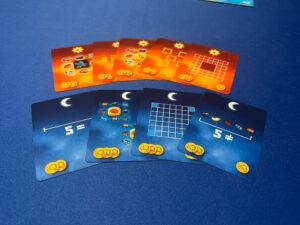
These objective cards change how you want to paint your cave. There are nine objective cards included in the game, with each being double-sided. One side is easier to complete than the other. You can do any combination of difficulties to make up your objectives. Some sun examples include painting a column with 5 different animals or connecting the top left of your cave to the bottom right, while some moon examples are paint a group of ten of the same animals or paint all four corners of your cave. This variability really added to the replay value of the game.
I only have two minor issues with the game.
First, it is not very fun at two players. The game thrives on the interaction of the planning phase. With two people it is obviously not as interactive. I prefer three or four players. This game does not significantly increase in playtime with additional players, which is another plus.
Second, the card art is very repetitive. Each hunting value has the same hunter on both cards, and the only difference between the different colored hunters of that value is their clothing. The poses, face, body… everything is the same. I know art can be expensive, but I wish there were more differences between the tribes.
Final Thoughts:
I really enjoyed Prehistories. I was not expecting to enjoy it as much as I did. I do not have many games in my collection that support two to five players, play in about 30 minutes, and have this much interaction. This is the perfect family game to add to your collection. Even if you don’t think it is for you, I would recommend at least playing Prehistories once. You may be surprised!
Final Score: 4 Stars – An engaging family game that I HIGHLY recommend.
 Hits:
Hits:
• Interaction of the planning phase is fantastic
• Trying to get the right animal tiles in the right size is fun
• Painting your cave is a great polyomino mechanism
• Replay value due to the number of objectives is high
• Plays quickly, easy to set up and easy to clean up
Misses:
• Not great at 2 players
• Card art could be more varied




